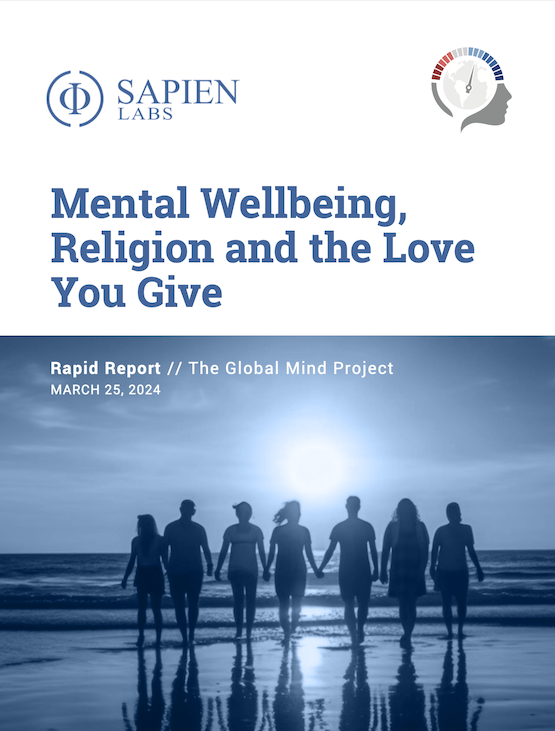Mental Wellbeing, Religion and the Love You Give
March 25, 2024
As human beings, we have an innate capacity to love and care for the wellbeing of others. It is the force that drives us to act in ways that are self-less, to look beyond greed and envy, to help one another and to find forgiveness and reconciliation. In every religion from Christianity to Islam to Buddhism, love for others holds a prominent place.
Research has found that love, spirituality and religion are all associated with greater mental wellbeing, but what is their relationship? In this report based on a sample of over 230,000 internet-enabled people across 65 countries that cover all major religions, we begin to untangle this relationship. We ask how one’s spirituality (or lack thereof) relates to the love you feel for others, how active religious practice drives spirituality and love, and whether love and spirituality have distinguishing impact on mental wellbeing.
Key Findings:
- Those who are spiritual love and care for the wellbeing of a wider circle of people, while those who are atheist are five times more likely to love no-one.
- The increase in mental wellbeing gained through spirituality arises through the increase in one’s feelings of love and care for others, and spirituality without love and care for others does not have mental wellbeing benefits.
- Active religious practice is associated with a higher likelihood of spirituality and love for others, regardless of religious affiliation.
- More religious regions of the world have greater love for others led by Latin America, South-East Asia, and Sub-Saharan Africa. Europe and Oceania have the least love for others with United Kingdom and Germany having the lowest among all countries from which data was collected.
WHAT IS MENTAL WELLBEING? Mental wellbeing reflects our mental capability and functioning, as well as our ability to navigate and cope with life’s stresses. It is not the same as happiness or life satisfaction. You could, for example, be experiencing very difficult or sad circumstances in your life but nonetheless have all the capabilities to cope as best as one could, and therefore have a high level of mental wellbeing.

Read the Report
Download Report in English (PDF)
Download Report in Spanish (PDF)
Download Data Table
View Data Graphs
Cite this report as:
Mental Wellbeing, Religion and the Love You Give, Global Mind Project, Sapien Labs, March 25, 2024.
This report is based on data from 239,692 internet-enabled respondents across 65 countries, obtained between January 2023 and February 2024 as part of the Global Mind Project. Data were collected using an assessment called the Mental Health Quotient, or MHQ, which assesses 47 aspects of mental feeling and function that are aggregated into a overall mental wellbeing score.
It’s important to note that this data is from online respondents and does not include people without internet access. This will have a bigger impact in some developing countries where many communities live offline.

















